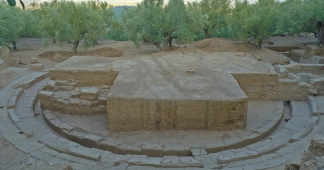The Story Behind the Genius of the Greek Computer and its Demise
by Evaggelos G. Vallianatos
View First 25 Pages: (free download)
Synopsis
In Antikythera Mechanism: The Story Behind the Genius of the Greek Computer and Its Demise, Evaggelos G. Vallianatos, historian and ecopolitical theorist, shows that after the conquest of Persia by Alexander the Great in the late fourth century BCE, the Greeks, especially in Egypt, reached unprecedented heights of achievements in science, technology, and civilization. The Antikythera Mechanism, an astronomical computer probably crafted in Rhodes in the second century BCE, was proof of that prowess. It’s the grandfather of our computers.
Greek sponge divers discovered the Antikythera Mechanism in 1900 on a 2,100-year-old Roman-era shipwreck. The hand-powered device reveals a sophisticated Greek technology previously unknown to scholars and historians, not seen and understood again until the twentieth and twenty-first centuries. The book not only describes how the sophisticated political and technological infrastructure of the Greeks after Alexander the Great resulted in the Antikythera celestial computer, and the bedrock of science and technology we know today, but also how the influence of Christianity on Greek civilization destroyed the nascent computer age of ancient Greece. Vallianatos, born in Greece and educated in America, is a historian, author, and journalist. He is a passionate champion of Greek culture and a well-suited guide to this historical account. Vallianatos explains how and why Greek scientists employed advanced engineering in translating the beautiful conception of the Antikythera Mechanism into an astronomical computer of genius: a bronze-geared device of mathematical astronomy, predicting the eclipses of the Sun and the Moon; calculating the risings and settings of important stars and constellations, and the movements of the planets around the Sun; while mechanizing the predictions of scientific theories. The computer’s accurate calendar connected these cosmic phenomena to the Olympics and other major Panhellenic religious and athletic celebrations, bringing the Greeks closer to their gods, traditions, and the Cosmos.
This book is unlike any other. It tells the story behind the genius of the Antikythera Mechanism, including the decoding of its secrets in the last 120 years and much more. It gives the ancient Greek historical context that makes sense of the computer, explaining its matchless genius. This book would be of great interest to discerning readers, especially those who love Greek civilization and are curious about the origins of science. It’s also full of insights for computer geeks, start-ups, computer company designers, and users.
A bold new interpretation, Antikythera Mechanism tells a riveting story of the Greeks’ greatest technological achievement, and how Christianity ended a potential computer age in ancient Greece.
WORDS OF PRAISE
This book describes clearly a new discovery that deserves to be known as a landmark of science. Vallianatos knows the latest scholarship yet presents a sophisticated subject in a fascinating, rapid narrative accessible to readers with no prior background. He shows that a proper appreciation of science is important for humanity and indeed urgent at the present time. Science is in fact the greatest contribution of ancient Greek civilization. Cell-phone technology is not science. This book shows how the sciences and the humanities, including an understanding of great achievements of the past, must cooperate to ensure the future of humanity.
–John R. Lenz, Ph.D., Assoc. Professor of Classics and of History & Culture (Ph.D. program), Drew University, Madison, New Jersey; ex-President of the Bertrand Russell Society
I can think of no better book to describe [the second century BCE Greek computer] than this one and no author better prepared to serve as your guide: a man born in Greece, educated in his nation’s legendary past, and professionally trained in the methods of modern science. Moreover, as a popular author and widely-read journalist, Dr. Vallianatos has demonstrated his passionate commitment to celebrating the tale of his ancestors’ intellectual adventure in scientifically investigating the wonders of the cosmos.
–Stephen Bertman, Ph.D., professor emeritus, Canada’s Windsor University; author, The Genesis of Science: The Story of Greek Imagination
Vallianatos’ book gives a thorough account of the origin and development of the great technological achievements of ancient Greece. It also throws light on the devastating influence of Christianity on all aspects of Greek culture, including science and technology. Moreover, this book is well-documented and highly referenced, constituting a great basis for future researchers. To the best of my knowledge, Vallianatos’ book is one of the best, if not the best book ever written on ancient Greek science and technology.
–Stephanos Paipetis, Ph.D., Professor of Applied Mechanics and specialist on Advanced Aerospace Composites, University of Patras, Greece. Author of The Unknown Technology in Homer
Vallianatos’ book is an insightful iconoclastic history of how and why the Greeks invented and build the Antikythera computer 2200 years ago. It is well-written, speaking to philosophers, classicists, scientists, computer experts and the intelligent public. Its main message is that the Greeks invented science and technology as we know them today. The Antikythera computer, The Tablet, was a product of an extremely sophisticated political and technological infrastructure. It was fueled by scientific technology. It sparked our age. It is a model for NASA’s robots for the exploration of extreme environments in the planets. Read this important book. It is Greek history at its best; it is our history.
–Christos Evangeliou, Ph.D., Professor of Hellenic Philosophy at Towson University, Towson, Maryland
The Antikythera ‘computer’ has long puzzled classical scholars who had no suspicion of Greek prowess in this field. It has also proved a puzzle for computer experts. Vallianatos has new observations to make about it, based on very close study of its manufacture and inscriptions. [His book] is a signal contribution to classical, mathematical and historical studies.
–Sir John Boardman, Lincoln Professor Emeritus of Classical Archaeology at Oxford University and a Fellow of the British Academy.
I find Dr. Vallianatos’ writing vivacious, engaging, and at times passionate. His thesis that it was Christianity that brought to an end ancient Greece’s nascent computer age will certainly raise a few eyebrows but might also stimulate a lively debate. It is commendable that he takes pains to situate the instrument [Computer / the Tablet] within the context of Greek civilization. Dr. Vallianatos is in the grip of an idea and his enthusiasm for his subject is admirable.
— Robert Garland, Wooster Professor of the Classics at Colgate University, Hamilton, New York.
Published at www.universal-publishers.com
We remind our readers that publication of articles on our site does not mean that we agree with what is written. Our policy is to publish anything which we consider of interest, so as to assist our readers in forming their opinions. Sometimes we even publish articles with which we totally disagree, since we believe it is important for our readers to be informed on as wide a spectrum of views as possible.











